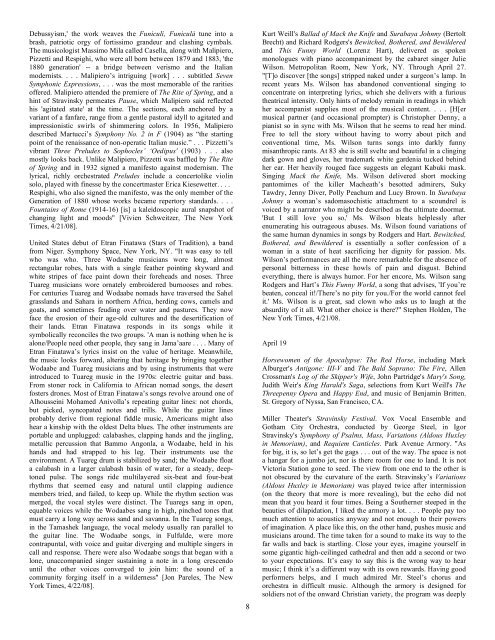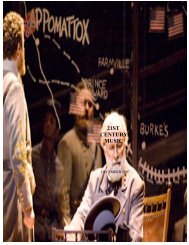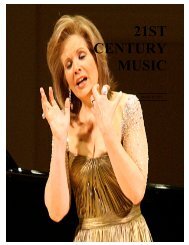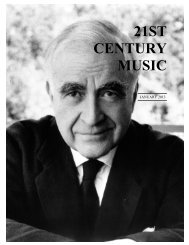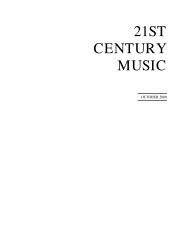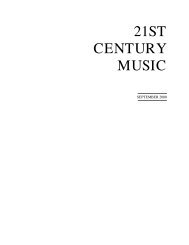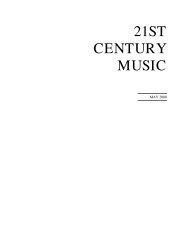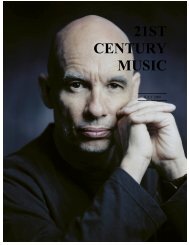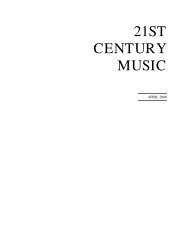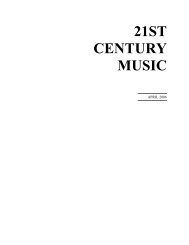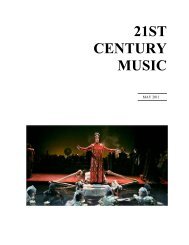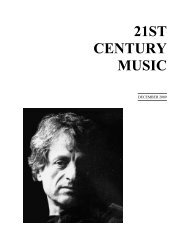Songs of Igor Stravinsky - 21st Century Music
Songs of Igor Stravinsky - 21st Century Music
Songs of Igor Stravinsky - 21st Century Music
Create successful ePaper yourself
Turn your PDF publications into a flip-book with our unique Google optimized e-Paper software.
Debussyism,' the work weaves the Funiculì, Funiculà tune into a<br />
brash, patriotic orgy <strong>of</strong> fortissimo grandeur and clashing cymbals.<br />
The musicologist Massimo Mila called Casella, along with Malipiero,<br />
Pizzetti and Respighi, who were all born between 1879 and 1883, 'the<br />
1880 generation' -- a bridge between verismo and the Italian<br />
modernists. . . . Malipiero’s intriguing [work] . . . subtitled Seven<br />
Symphonic Expressions, . . . was the most memorable <strong>of</strong> the rarities<br />
<strong>of</strong>fered. Malipiero attended the premiere <strong>of</strong> The Rite <strong>of</strong> Spring, and a<br />
hint <strong>of</strong> <strong>Stravinsky</strong> permeates Pause, which Malipiero said reflected<br />
his 'agitated state' at the time. The sections, each anchored by a<br />
variant <strong>of</strong> a fanfare, range from a gentle pastoral idyll to agitated and<br />
impressionistic swirls <strong>of</strong> shimmering colors. In 1956, Malipiero<br />
described Martucci’s Symphony No. 2 in F (1904) as “the starting<br />
point <strong>of</strong> the renaissance <strong>of</strong> non-operatic Italian music.” . . . Pizzetti’s<br />
vibrant Three Preludes to Sophocles’ ‘Oedipus' (1903) . . . also<br />
mostly looks back. Unlike Malipiero, Pizzetti was baffled by The Rite<br />
<strong>of</strong> Spring and in 1932 signed a manifesto against modernism. The<br />
lyrical, richly orchestrated Preludes include a concertolike violin<br />
solo, played with finesse by the concertmaster Erica Kiesewetter. . . .<br />
Respighi, who also signed the manifesto, was the only member <strong>of</strong> the<br />
Generation <strong>of</strong> 1880 whose works became repertory standards. . . .<br />
Fountains <strong>of</strong> Rome (1914-16) [is] a kaleidoscopic aural snapshot <strong>of</strong><br />
changing light and moods" [Vivien Schweitzer, The New York<br />
Times, 4/21/08].<br />
United States debut <strong>of</strong> Etran Finatawa (Stars <strong>of</strong> Tradition), a band<br />
from Niger. Symphony Space, New York, NY. "It was easy to tell<br />
who was who. Three Wodaabe musicians wore long, almost<br />
rectangular robes, hats with a single feather pointing skyward and<br />
white stripes <strong>of</strong> face paint down their foreheads and noses. Three<br />
Tuareg musicians wore ornately embroidered burnooses and robes.<br />
For centuries Tuareg and Wodaabe nomads have traversed the Sahel<br />
grasslands and Sahara in northern Africa, herding cows, camels and<br />
goats, and sometimes feuding over water and pastures. They now<br />
face the erosion <strong>of</strong> their age-old cultures and the desertification <strong>of</strong><br />
their lands. Etran Finatawa responds in its songs while it<br />
symbolically reconciles the two groups. 'A man is nothing when he is<br />
alone/People need other people, they sang in Jama’aare . . . . Many <strong>of</strong><br />
Etran Finatawa’s lyrics insist on the value <strong>of</strong> heritage. Meanwhile,<br />
the music looks forward, altering that heritage by bringing together<br />
Wodaabe and Tuareg musicians and by using instruments that were<br />
introduced to Tuareg music in the 1970s: electric guitar and bass.<br />
From stoner rock in California to African nomad songs, the desert<br />
fosters drones. Most <strong>of</strong> Etran Finatawa’s songs revolve around one <strong>of</strong><br />
Alhousseini Mohamed Anivolla’s repeating guitar lines: not chords,<br />
but picked, syncopated notes and trills. While the guitar lines<br />
probably derive from regional fiddle music, Americans might also<br />
hear a kinship with the oldest Delta blues. The other instruments are<br />
portable and unplugged: calabashes, clapping hands and the jingling,<br />
metallic percussion that Bammo Angonla, a Wodaabe, held in his<br />
hands and had strapped to his leg. Their instruments use the<br />
environment. A Tuareg drum is stabilized by sand; the Wodaabe float<br />
a calabash in a larger calabash basin <strong>of</strong> water, for a steady, deeptoned<br />
pulse. The songs ride multilayered six-beat and four-beat<br />
rhythms that seemed easy and natural until clapping audience<br />
members tried, and failed, to keep up. While the rhythm section was<br />
merged, the vocal styles were distinct. The Tuaregs sang in open,<br />
equable voices while the Wodaabes sang in high, pinched tones that<br />
must carry a long way across sand and savanna. In the Tuareg songs,<br />
in the Tamashek language, the vocal melody usually ran parallel to<br />
the guitar line. The Wodaabe songs, in Fulfulde, were more<br />
contrapuntal, with voice and guitar diverging and multiple singers in<br />
call and response. There were also Wodaabe songs that began with a<br />
lone, unaccompanied singer sustaining a note in a long crescendo<br />
until the other voices converged to join him: the sound <strong>of</strong> a<br />
community forging itself in a wilderness" [Jon Pareles, The New<br />
York Times, 4/22/08].<br />
8<br />
Kurt Weill's Ballad <strong>of</strong> Mack the Knife and Surabaya Johnny (Bertolt<br />
Brecht) and Richard Rodgers's Bewitched, Bothered, and Bewildered<br />
and This Funny World (Lorenz Hart), delivered as spoken<br />
monologues with piano accompaniment by the cabaret singer Julie<br />
Wilson. Metropolitan Room, New York, NY. Through April 27.<br />
"[T]o discover [the songs] stripped naked under a surgeon’s lamp. In<br />
recent years Ms. Wilson has abandoned conventional singing to<br />
concentrate on interpreting lyrics, which she delivers with a furious<br />
theatrical intensity. Only hints <strong>of</strong> melody remain in readings in which<br />
her accompanist supplies most <strong>of</strong> the musical content. . . . [H[er<br />
musical partner (and occasional prompter) is Christopher Denny, a<br />
pianist so in sync with Ms. Wilson that he seems to read her mind.<br />
Free to tell the story without having to worry about pitch and<br />
conventional time, Ms. Wilson turns songs into darkly funny<br />
misanthropic rants. At 83 she is still svelte and beautiful in a clinging<br />
dark gown and gloves, her trademark white gardenia tucked behind<br />
her ear. Her heavily rouged face suggests an elegant Kabuki mask.<br />
Singing Mack the Knife, Ms. Wilson delivered short mocking<br />
pantomimes <strong>of</strong> the killer Macheath’s besotted admirers, Suky<br />
Tawdry, Jenny Diver, Polly Peachum and Lucy Brown. In Surabaya<br />
Johnny a woman’s sadomasochistic attachment to a scoundrel is<br />
voiced by a narrator who might be described as the ultimate doormat.<br />
'But I still love you so,' Ms. Wilson bleats helplessly after<br />
enumerating his outrageous abuses. Ms. Wilson found variations <strong>of</strong><br />
the same human dynamics in songs by Rodgers and Hart. Bewitched,<br />
Bothered, and Bewildered is essentially a s<strong>of</strong>ter confession <strong>of</strong> a<br />
woman in a state <strong>of</strong> heat sacrificing her dignity for passion. Ms.<br />
Wilson’s performances are all the more remarkable for the absence <strong>of</strong><br />
personal bitterness in these howls <strong>of</strong> pain and disgust. Behind<br />
everything, there is always humor. For her encore, Ms. Wilson sang<br />
Rodgers and Hart’s This Funny World, a song that advises, 'If you’re<br />
beaten, conceal it!/There’s no pity for you./For the world cannot feel<br />
it.' Ms. Wilson is a great, sad clown who asks us to laugh at the<br />
absurdity <strong>of</strong> it all. What other choice is there?" Stephen Holden, The<br />
New York Times, 4/21/08.<br />
April 19<br />
Horsewomen <strong>of</strong> the Apocalypse: The Red Horse, including Mark<br />
Alburger's Antigone: III-V and The Bald Soprano: The Fire, Allen<br />
Crossman's Log <strong>of</strong> the Skipper's Wife, John Partridge's Mary's Song,<br />
Judith Weir's King Harald's Saga, selections from Kurt Weill's The<br />
Threepenny Opera and Happy End, and music <strong>of</strong> Benjamin Britten.<br />
St. Gregory <strong>of</strong> Nyssa, San Francisco, CA.<br />
Miller Theater's <strong>Stravinsky</strong> Festival. Vox Vocal Ensemble and<br />
Gotham City Orchestra, conducted by George Steel, in <strong>Igor</strong><br />
<strong>Stravinsky</strong>'s Symphony <strong>of</strong> Psalms, Mass, Variations (Aldous Huxley<br />
in Memoriam), and Requiem Canticles. Park Avenue Armory. "As<br />
for big, it is, so let’s get the gags . . . out <strong>of</strong> the way. The space is not<br />
a hangar for a jumbo jet, nor is there room for one to land. It is not<br />
Victoria Station gone to seed. The view from one end to the other is<br />
not obscured by the curvature <strong>of</strong> the earth. <strong>Stravinsky</strong>’s Variations<br />
(Aldous Huxley in Memoriam) was played twice after intermission<br />
(on the theory that more is more revealing), but the echo did not<br />
mean that you heard it four times. Being a Southerner steeped in the<br />
beauties <strong>of</strong> dilapidation, I liked the armory a lot. . . . People pay too<br />
much attention to acoustics anyway and not enough to their powers<br />
<strong>of</strong> imagination. A place like this, on the other hand, pushes music and<br />
musicians around. The time taken for a sound to make its way to the<br />
far walls and back is startling. Close your eyes, imagine yourself in<br />
some gigantic high-ceilinged cathedral and then add a second or two<br />
to your expectations. It’s easy to say this is the wrong way to hear<br />
music; I think it’s a different way with its own rewards. Having good<br />
performers helps, and I much admired Mr. Steel’s chorus and<br />
orchestra in difficult music. Although the armory is designed for<br />
soldiers not <strong>of</strong> the onward Christian variety, the program was deeply


